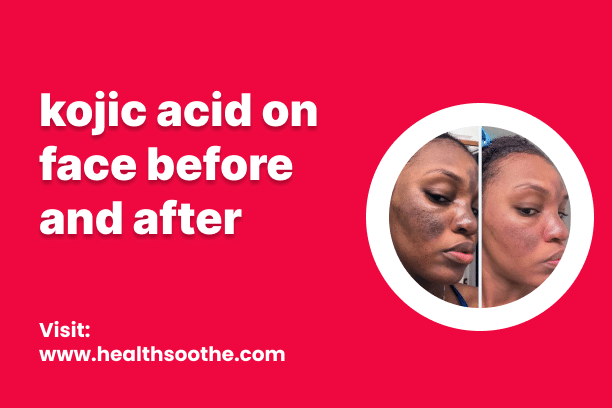Kojic acid is a substance derived from various fungi and is also found as a by-product of the fermentation process in soy sauce and rice wine. It has potential advantages such as treating melasma, diminishing scar visibility, among others. Besides, kojic acid serves as a natural preservative in certain food products and is commonly employed in health and beauty formulations. This article explores its applications, potential health perks, and any associated risks or adverse effects.
Uses
Kojic acid is utilized in health and beauty items for skin lightening purposes, often employed in treating skin conditions like sun damage, scars, and age spots.
Its mechanism of action involves its impact on melanin production. Melanin is a natural pigment in the body responsible for eye, hair, and skin coloration. Melanin synthesis requires the amino acid tyrosine.
Kojic acid functions by inhibiting the formation of tyrosine, thereby reducing melanin production, potentially resulting in skin lightening.
Most commonly found in cosmetic formulations like creams, lotions, and serums, kojic acid is also present in some soaps, primarily designed for application on hands or face but can also be used on other body parts like legs and arms. Cosmetic products typically contain kojic acid concentrations ranging from 1 to 4 percent.
Depending on the product type, some formulations with kojic acid are meant to be applied and absorbed, such as serums, while others, like soaps, are applied and then rinsed off.
Benefits
Using products containing kojic acid can offer several benefits:
- Anti-aging effect: These products can lighten the skin, improving the appearance of age spots and sun damage. By reducing dark spots, they contribute to an anti-aging effect.
- Melasma treatment: Kojic acid may aid in reducing melasma, a condition where the skin darkens during pregnancy.
- Scar appearance reduction: While not affecting scar thickness, kojic acid can lessen scar discoloration, making scars less noticeable.
- Antifungal properties: Kojic acid is believed to have antifungal benefits, potentially preventing and treating fungal infections like athlete’s foot and yeast infections.
- Antibacterial effects: It may also offer antibacterial advantages, lowering the risk of common bacterial skin infections.
Read Also: Does Tramadol Make You Sleepy Or Awake? – Meds Safety
Pros and Cons of Kojic Acid
Pros:
- Skin Lightening
- Treatment of Skin Conditions
- Antifungal Properties
- Anti-aging Effects
Cons:
- Increased Sun Sensitivity
- Risk of Irritation
- Potential for Contact Dermatitis
Differences Between Kojic Acid and kojic acid serums
Kojic Acid Face Wash:
Primarily used for daily cleansing and removing surface impurities. It may also provide some skin-lightening benefits over time with regular use.
Kojic Acid Serums:
Targeted towards specific skincare concerns such as hyperpigmentation, dark spots, melasma, and uneven skin tone. Serums are designed to deliver potent active ingredients directly to the skin for targeted treatment and long-term improvement.
Alternative to Kojic Acid
Vitamin C (Ascorbic Acid):
Vitamin C is a potent antioxidant that can brighten the skin and reduce the appearance of dark spots and hyperpigmentation. It also helps in collagen production, promoting healthier and more radiant skin.
Safety
Before using products containing kojic acid, it’s crucial to ensure their safety.
Unlike medicines and foods, cosmetic products are not regulated in the same manner. They are not required to be FDA-approved before being sold.
However, there is a voluntary registration program for cosmetic manufacturers through which companies can disclose their product-making processes. Additionally, the Cosmetic Ingredient Review (CIR) Expert Panel evaluates safety.
Studies on mice have suggested a potential link between high concentrations of kojic acid and tumor growth, but this link is considered weak because the acid is slowly absorbed into the body. It’s unlikely that levels would reach a point to cause cancer in humans.
According to reviews, products with 2 percent kojic acid concentration for skin application are generally deemed safe. The CIR Expert Panel also supports the safe use of kojic acid in cosmetics.
Raw kojic acid is available but not recommended for direct skin use. It should be diluted to no more than 4 percent concentration, preferably 1 to 2 percent to minimize skin irritation.
Adding raw kojic acid to creams or lotions can be challenging and may lead to irritating skin levels. Using pre-made products with specific kojic acid concentrations is a more advisable approach.
Risks
While products containing kojic acid are generally considered safe for most individuals, there are potential risks and side effects to be aware of:
- Increased sun sensitivity: Kojic acid may make the skin more susceptible to sunburn. Since it inhibits melanin production, which helps protect against UV rays, the skin becomes more vulnerable to sun damage.
- Contact dermatitis: Some individuals, particularly those with sensitive skin, may experience contact dermatitis when using kojic acid. This condition can manifest as a rash, itching, dry patches, and in severe cases, pain and blisters.
The concentration of kojic acid in different products like creams, serums, and soaps can vary among manufacturers. Higher concentrations may increase the likelihood of skin irritation.
Conclusion
when considering a Kojic Acid Face Wash, it’s essential to weigh its potential benefits against possible risks. While Kojic acid can offer advantages like skin lightening and addressing certain skin conditions, such as melasma and scars, it also carries risks such as increased sun sensitivity and the potential for contact dermatitis, especially with higher concentrations. Therefore, individuals with sensitive skin or those prone to sunburn should use caution and consult with a dermatologist before incorporating a Kojic Acid Face Wash into their skincare routine. Additionally, opting for products with lower concentrations of Kojic acid may help reduce the likelihood of adverse reactions while still providing skincare benefits.


